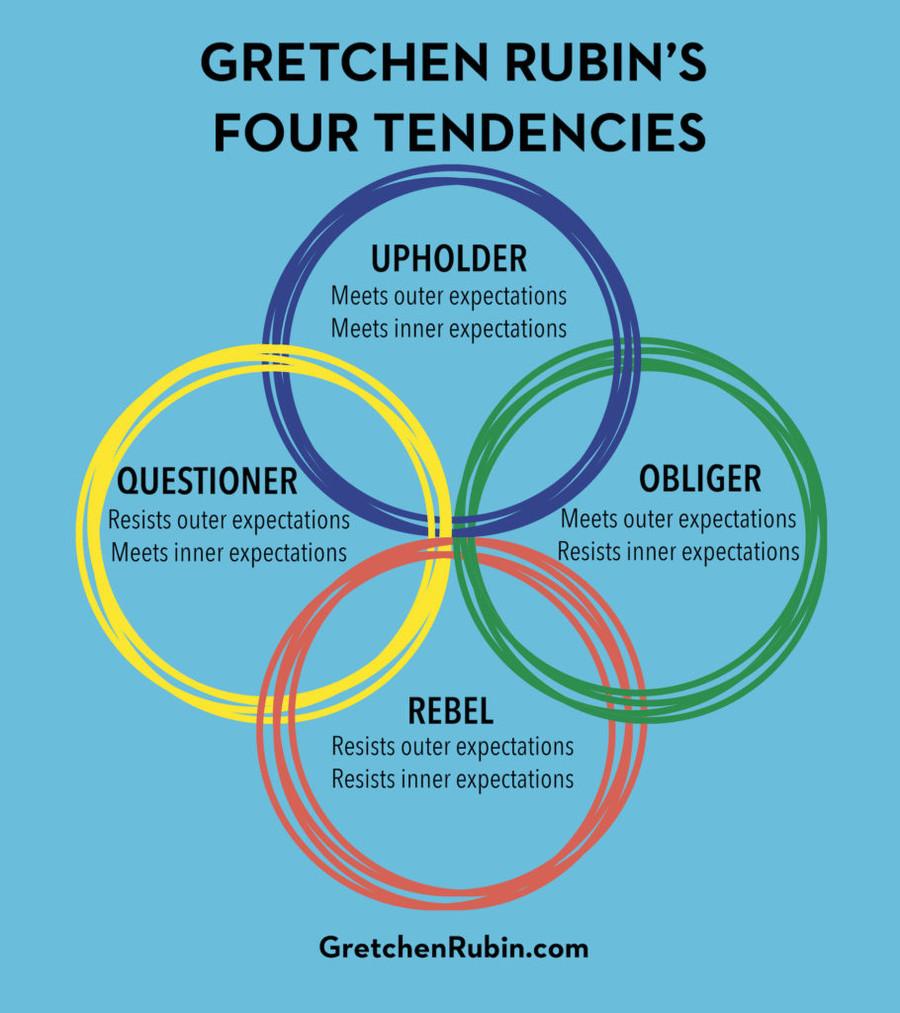Ralph Caldwell's Key Ideas from The Four Tendencies
by Gretchen Rubin
Ideas, facts & insights covering these topics:
11 ideas
·29.5K reads
169
3
Explore the World's Best Ideas
Join today and uncover 100+ curated journeys from 50+ topics. Unlock access to our mobile app with extensive features.
There is no magic, one-size-fits all answer for building a happier, healthier, more productive life.
GRETCHEN RUBIN
178
5.06K reads
Learning To Live While We Live
Most of us aren’t ready for all the expectations the world piles onto us, let alone the internal ones we have of ourselves that add to the pressure.
And yet, somehow we deal with them. We learn, we struggle and over time, hopefully we get better. Of course we develop much of our approach to dealing with our internal and life’s external expectations subconsciously. Identifying the approach you’ve shaped so far is what The Four Tendencies are for.
175
3.37K reads
The Four Tendencies: The Premise
The Four Tendencies is a personality profile framework to help you understand how you and the people around you deal with their outer and inner expectations, so you can better manage your life, work and relationships.
Understanding the four tendencies has three primary benefits:
1. Self-mastery in getting yourself to do things.
2. Influencing others to do things.
3. Understanding why others do or don’t do things, which reduces frustration and increases harmony.
194
3.27K reads
Upholders, Questioners, Obligers and Rebels
Upholders meet inner and outer expectations. They love rules, having a clear plan and are self-motivated and disciplined.
Questioners meet their own expectations, but resist outer ones. They need to see purpose and reason in anything they do.
Obligers meet other peoples’ expectations easily, but struggle with their own. The must be held accountable by a friend, coach or boss to get things done.
Rebels defy both outer and inner expectations. Above all, they want to be free to choose and express their own individuality.
242
3.22K reads
Obligers: The Biggest and Hardest Group to Be In
The largest group are Obligers.
In theory, that’s not a problem, because it’s fairly easy for Obligers to make good use of their tendency. As long as they set up a good accountability system, they can be consistent and reach their goals.
Obligers often face the biggest inner struggle, because they always put everyone else before themselves.
This can culminate in self-sabotage through little acts of defiance that end up hurting themselves more than anyone else, for example failing a test on purpose, just to prove a point.
189
2.5K reads
Upholders: People Who Are Good at Upholding Their Commitments and Responsibilities
An Upholder is someone who gets things done efficiently and makes time for themselves as well. An Upholders responds well to both other people’s expectations and their own personal ones so they’re very reliable at work and get all of their tasks done without any trouble.
Some upholders can be so obedient that they don’t question what the rules are and follow them without thinking. These people often become snitches because of their need to obey authority. They also tend to resist change, which is why they’re not as successful in life as others who are more critical thinkers.
180
2.02K reads
Questioners: The Quest For Logic And Purpose
Questioners turn all outer expectations into inner expectations if they believe its reasonable and efficient. Thus, Questioners only meet inner expectations.
Questioners excel at being logical and efficient in everything they do. But they can also be viewed as annoying for their constant questioning unless they are very socially adept when asking those questions.
Some random characteristics of Questioners: They hate waiting in line, they love spreadsheets, and they love sharing articles.
193
2.06K reads
Questioners have the self-direction of Upholders, the reliability of Obligers, and the authenticity of Rebels.
GRETCHEN RUBIN
176
2.31K reads
Rebels: The Misfits
Rebels want to do what they want to do, in their own way, and on their own time. If someone else tells them to do the exact same thing, they will resist. They don’t even want to tell themselves to do something. They prefer to act from freedom, choice, and self-expression.
Rebels might struggle with themselves because conventional advice doesn’t work for them. They are told to set goals and to get outer accountability by all the other tendencies, but those things actually make it harder for Rebels to do things because they feel a lack of freedom.
177
1.78K reads
The Four Tendencies: Multiple Traits
People fit squarely into one of the four tendencies. If you want to get into more detail, then technically, people fit into one of 8 primary-secondary combinations:
- Upholder-Questioner
- Upholder-Obliger
- Obliger-Upholder
- Obliger-Rebel
- Questioner-Upholder
- Questioner-Rebel
- Rebel-Obliger
- Rebel-Questioner
For example, a Questioner-Upholder is more likely to meet outer expectations than a Questioner-Rebel.
175
2.03K reads
Don’t Box Yourself in With This Framework, Use It to Understand Your Own Behavior Better
It’s easy to get carried away with personality types like these, but that’s dangerous. When you chisel your tendency in stone you might accept it, but you’ll also turn it into an excuse and stop believing that you can change.
Instead of putting yourself in a box, use this concept to get to know yourself better, identify your strengths and weaknesses, and improve your relationships with others by being mindful of their tendencies.
177
1.87K reads
IDEAS CURATED BY
CURATOR'S NOTE
The four personality types.
“
Ralph Caldwell's ideas are part of this journey:
Learn more about books with this collection
How to practice effectively
The importance of consistency
How to immerse yourself in the language
Related collections
Discover Key Ideas from Books on Similar Topics
2 ideas
Better Than Before
Gretchen Rubin
15 ideas
Who Not How
Dan Sullivan, Dr. Benjamin Hardy
4 ideas
What is your philosophy of life?
medium.com
Read & Learn
20x Faster
without
deepstash
with
deepstash
with
deepstash
Personalized microlearning
—
100+ Learning Journeys
—
Access to 200,000+ ideas
—
Access to the mobile app
—
Unlimited idea saving
—
—
Unlimited history
—
—
Unlimited listening to ideas
—
—
Downloading & offline access
—
—
Supercharge your mind with one idea per day
Enter your email and spend 1 minute every day to learn something new.
I agree to receive email updates










